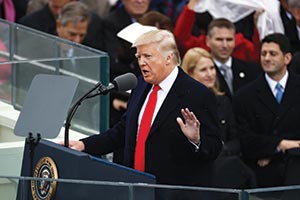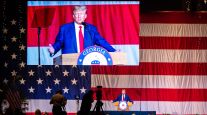Trump’s Initial Moves Elicit Praise, Caution From Trucking

This story appears in the Jan. 30 print edition of Transport Topics.
In his inaugural address as president of the United States, Donald Trump vowed to renegotiate trade agreements, boost the economy by reducing regulations, clamp down on immigration and spend more money to upgrade the nation’s infrastructure.
Then, less than a week after taking office, Trump began making good on those promises: signing a memorandum to withdraw the United States from the Trans-Pacific Partnership, ordering a hiring freeze across the federal government and halting implementation of new regulations, including entry-level driver training rules that were slated to take effect Feb. 6.
The president also instructed officials at the Environmental Protection Agency to suspend all contract and grant awards, and he temporarily banned some federal agencies from publishing news releases or sharing information on social media.
Reaction to Trump’s actions was mixed, with many trucking executives applauding moves to stimulate business activity but others, including FedEx Corp. CEO Fred Smith, raising concern about changes in U.S. trade and immigration policies.
“The United States being cut off from trade would be like trying to breathe without oxygen,” Smith warned during an interview broadcast Jan. 24 on a business network. “I think the decision to pull out of TPP is unfortunate because the real beneficiary of that is China. We need to get the Chinese to open up their 1.3 billion- person market, not cut them off.”
Infrastructure was front and center Jan. 24, when the president issued a series of executive orders to expedite environmental reviews of high- priority infrastructure projects, including construction of the Keystone XL Pipeline and Dakota Access Pipeline.
He also asked the secretary of commerce to submit a report on ways to reduce regulatory burdens for domestic manufacturers and streamline the approval process for projects to rebuild highways, bridges, tunnels, the electrical grid, ports, water systems, airports, railways and pipelines.
“With Trump coming in, we see increased spending,” said Don Welchoff, executive vice president of The Roadmaster Group, a Glendale, Arizona, company that provides transportation of hazardous materials, specialized heavy hauls and logistics services.
He said he expects a revival in oil and gas and mining activity and a boost in manufacturing, all of which will boost demand for freight transportation in the year ahead.
“All of trucking certainly could thrive,” Welchoff said.
Boyd Ruff, a commercial driver training school director for Sage Technical Services, sees a possible downside to an upturn in the economy. “Creating manufacturing jobs will create freight loads, but the wages of those workers will make it harder to retain drivers,” Ruff said.
Furthermore, Trump initiated action to begin building a wall on the border with Mexico and to remove immigrants who are in the country illegally or who are deemed to pose a risk to public safety or national security. Some companies say they already are feeling the effects of restrictions on immigration.
Elizabeth Spradley, senior vice president of human resources at Suddath Cos. in Jacksonville, Florida, said the inability to hire seasonal workers will create hardships for moving companies.
“We have used foreign students on J-1 visas to complement our summer peak period needs,” Spradley told Transport Topics. “However, in the past two years, it has become more difficult to employ them and more expensive.”
Creating the most uncertainty for trucking is the president’s stance on trade and, in particular, his pledge to renegotiate terms of the North American Free Trade Agreement with Mexico and Canada.
“Trump says he’ll renegotiate trade deals to spur domestic manufacturing and points to U.S. trade deficits for justification,” said Ted Morandin, managing partner at Morprop Advisors, a transportation property broker based in Annapolis, Maryland. “But most see trade deficits as the product of reduced international demand and lower foreign labor costs, not bad trade deals.”
Morandin added that most of the job losses in U.S. manufacturing were due to automation, not trade.
In a letter to President Trump, the National Grain and Feed Association, a group representing more than 130 food and agriculture organizations and companies, expressed their desire to work with him to “modernize” elements of Nafta “while preserving and expanding the gains achieved to date.”
The value of food exported among the United States, Mexico and Canada has quadrupled in the 20 years since Nafta was implemented, totaling $130 billion in 2015, according to the letter sent Jan. 24.
Brian Corcoran, president of Raymond Corcoran Trucking Inc. in Billings, Montana, said he wants to see a crackdown on Canadian truckers picking up loads in the United States in violation of laws that limit cabotage, or the movement of domestic freight by foreign carriers.
“Canadians are not able to unload in the U.S. and reload for a U.S. destination,” Corcoran explained. “They must load a Canadian destination load.”
In Congress, lawmakers could reverse some Obama administration regulations, potentially including the greenhouse-gas and fuel- efficiency rule that the Environmental Protection Agency promulgated in June, said Bill Sullivan, executive vice president for advocacy for American Trucking Associations.
Rules in the pipeline, such as a requirement that new trucks be equipped with speed limiters, are also “effectively frozen” until the new administration has time to review them, Sullivan said.
Unaffected by the change in administration, however, is the Federal Motor Carrier Safety Administration requirement that truckers begin using electronic logging devices, a rule that takes effect in December.


